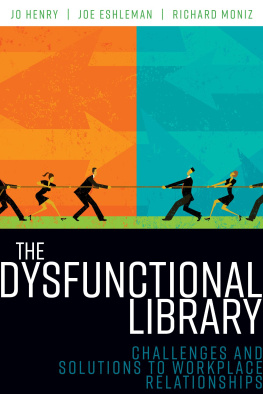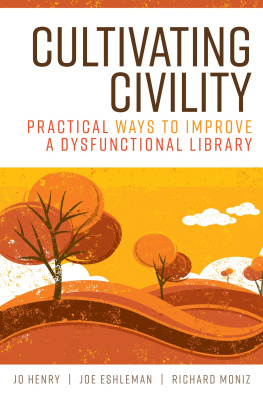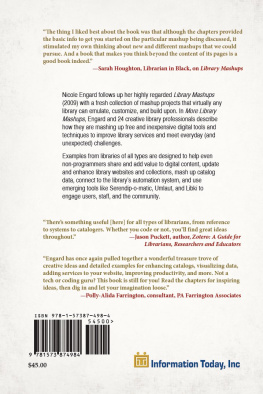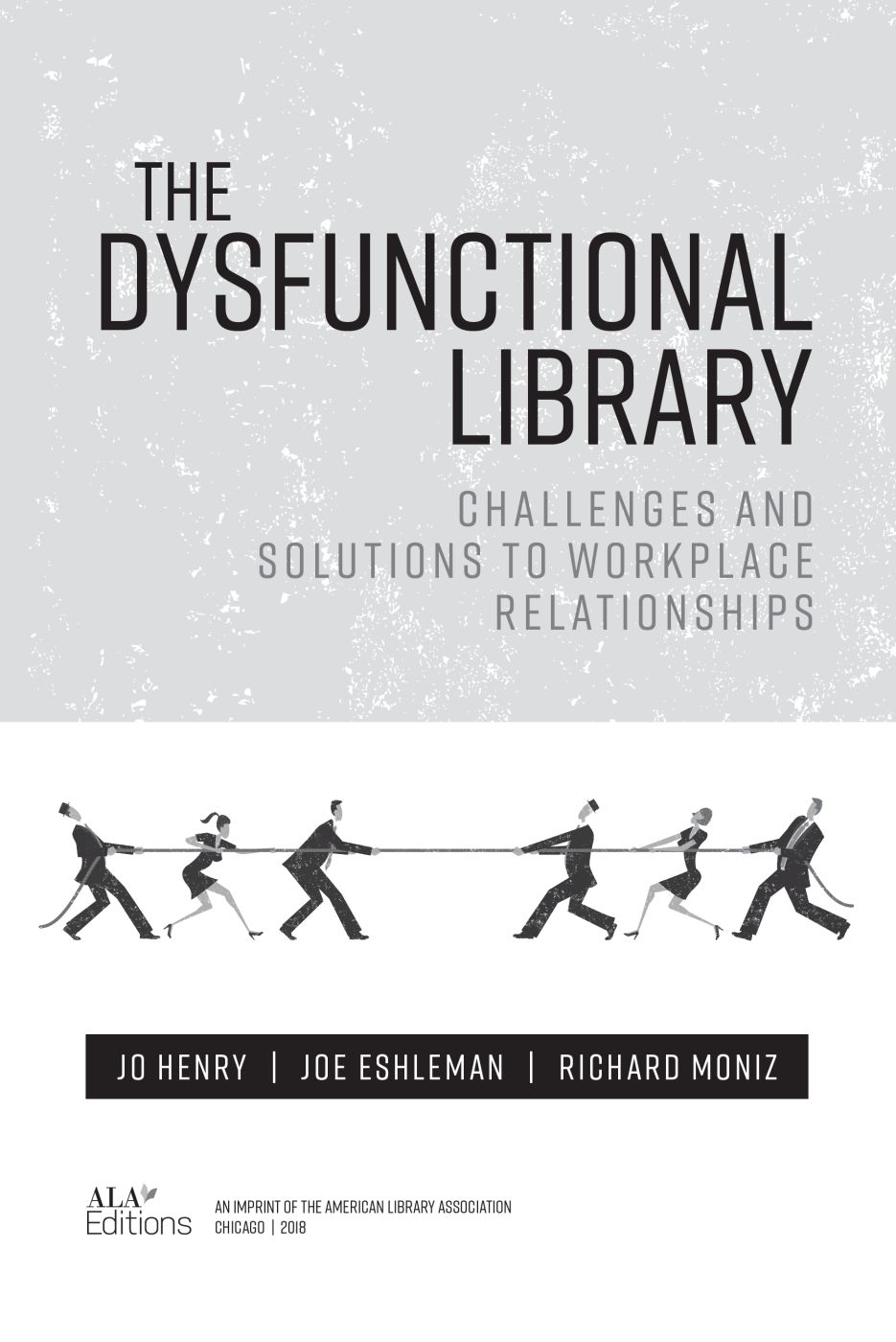
ALA Editions purchases fund advocacy, awareness, and accreditation programs for library professionals worldwide.
2018 by Jo Henry, Joe Eshleman, and Richard Moniz
Extensive effort has gone into ensuring the reliability of the information in this book; however, the publisher makes no warranty, express or implied, with respect to the material contained herein.
ISBNs
978-0-8389-1623-0 (paper)
978-0-8389-1671-1 (PDF)
978-0-8389-1670-4 (ePub)
978-0-8389-1672-8 (Kindle)
Library of Congress Cataloging-in-Publication Data
Names: Henry, Jo, author. | Eshleman, Joe, author. | Moniz, Richard, author.
Title: The dysfunctional library : challenges and solutions to workplace relationships / Jo Henry, Joe Eshleman, Richard Moniz.
Description: First edition. | Chicago : ALA Editions, an imprint of the American Library Association, 2018. | Includes index.
Identifiers: LCCN 2017031305| ISBN 9780838916230 (pbk. : alk. paper) | ISBN 9780838916704 (ePub) | ISBN 9780838916711 (PDF) | ISBN 9780838916728 (Kindle)
Subjects: LCSH: Library personnel management. | Communication in library administration. | Library employeesPsychology. | Team librarianship. | Conflict management. | Organizational behavior.
Classification: LCC Z682 .H495 2018 | DDC 023dc23
LC record available at https://lccn.loc.gov/2017031305
Cover design by Karen Sheets de Gracia.
We would like to dedicate this book in memory of
CHRIS RHODES, EDITOR EXTRAORDINAIRE .
CONTENTS
We would like to thank ALAs editorial board for its overwhelming support of our book. We especially want to say a huge thank you to our editor Jamie Santoro for all her support with this project. As with our other books, she has provided invaluable feedback and guidance throughout the process. We would also like to thank all the other members of the ALA Editions-ALA Neal Schuman team who work behind the scenes with great success. Thanks to marketing manager Jill Hillemeyer, marketing coordinator Rob Christopher, and their staff. Rob not only assisted with marketing for our book but with review and distribution of our incivility survey, which provided supporting evidence for our text on incivility issues within library organizations. We would also like to recognize Angela Gwizdala, director of editing, design, and production, her editorial staff, and copy editor Helayne Beavers for seeing us through the final stages of publication.
Additionally, we would like to thank all those who replied to our 2017 incivility survey. You provided valuable feedback and supporting evidence for the text. We read every comment from the over 4,100 respondents. You know who you are! We hope many of you will find both validation and hope for an improved work environment through our work.
As in all our writing projects, the support of spouses, family, and friends is invaluable. They too sacrifice as we take time away from them for research and writing. Without their continuous support, our work would not be possible. Finally, we would like to acknowledge our parents, who played a vital role in shaping us into the individuals we are today and giving us the opportunities and wisdom to be able to complete a project like this.
When we first began this project, our discussions ranged from successes to challenges to managerial methods we had encountered during our nearly fifty years of collective managerial experience. Inevitably, the challenges left the deepest impressions, which steered us towards the topic of workplace dysfunction. Instead of writing another how-to book about library management, we focused on this concept. At the time, we did not know our exploration of dysfunction would lead us to information that was valuable not only to managers, but to anyone working in a library organization. It was not surprising that much of what we found echoed managerial and staff challenges we had experienced. Many have asked us if this is a tell-all book about our experiences. It is not. Instead, we chose to approach the topic from an academic viewpoint and draw our final conclusions from available evidence. Our work led us to define and categorize dysfunctional behaviors and to look at potential solutions.
When discussing this project with friends and peers, nearly every conversation produced a story about a problem with a coworker or manager. Even years later, many of the stories were emotionally charged. We would later discover that this long-lasting impact is not uncommon. Many people we talked with asked us to include their specific issue because they wanted to prevent others from encountering similar negative experiences in the future. However, because the range of individual dysfunctions is extensive, we could not address them all. We were, however, able to address many, and we believe everyone who reads this book will be able to personally relate to this work. One of the goals in writing this book was to inspire discussion about dysfunction in the library workplace. Another was to provide practical and useful solutions for these challenging situations. It is our hope that we have accomplished both goals.
Although many of the topics of individual chapters could be the subject of entire books, we strove to provide an overview of various dysfunctions found in many organizations, including libraries. Our focus was on the library work environment rather than interactions with students or patrons. Because there was limited research specific to the topic, we conducted our own survey of 4,186 library workers. Many of the study results have been included in the text. Not surprisingly, our library-specific survey results on dysfunction were similar to studies of other industries and organizations. Although libraries are unique in many ways from other organizational environments, they face similar challenges from workplace dysfunction.
This journey into workplace dysfunction cannot begin without self-examination. examines the importance of understanding our relationship to the library workplace and identifies library specific attributes that foster personal achievement. This chapter also addresses the important role emotional intelligence plays in an individuals success as a functioning contributor to the library workplace, while acknowledging that psychological disorders and burnout are significant elements with which library staff must deal. It also offers examples of dysfunction and remedies for library-specific problems.
Whereas The chapter explores how silos within the organizational structure negatively impact communication. Overbearing bureaucracies create a culture of dysfunction by stifling workers voices and creativity. Worst of all, poor leadership, especially when it ignores bad behavior, can be corrosive to a librarys culture. Finally, the chapter reflects on other potential causes and impacts a dysfunctional organizational culture can create.
is the first of two chapters dealing with individual deviant behaviors that are based on interpersonal relationships. The minor deviant behaviors are reviewed in this chapter. Incivility is present in all work organizations, libraries included. We investigate findings of the library-specific incivility survey, which documented the prevalence of rude behaviors in library work environments. This kind of dysfunction (which is experienced more often among the younger generations) is on the rise. The chapter goes on to review its causes and effects and explores solutions for workplace incivility.
Next page
